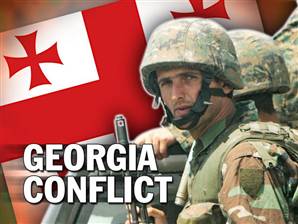Georgia conflict parties agree on open communication lines
 Geneva - All sides involved in the talks on last summer's Georgia conflict agreed Wednesday in Geneva to set up a telephone hotline and hold weekly meetings on security incidents.
Geneva - All sides involved in the talks on last summer's Georgia conflict agreed Wednesday in Geneva to set up a telephone hotline and hold weekly meetings on security incidents.
However, other issues at the eight-party talks at the UN's headquarters in the Swiss city, such as joint missions to conflict areas and humanitarian assistance, and even the date for the next round of talks, remain stalled.
"The mechanisms that have been created have the objective of securing peace and security and are necessary for prevention and necessary to provide responses to incidents which may cause suffering to civilian population," European Union negotiator Pierre Morel said.
In addition to the EU, sides to the talks include the United Nations, the Organization for Security and Cooperation in Europe (OSCE), the United States, Russia, Georgia and the two breakaway regions of Abkhazia and South Ossetia.
The contact between the sides will include now meetings at least once a week and the establishment of an active telephone hotline.
"The next step is implementation of the commitments taken by the parties today," said Johan Verbeke, the head of the UN Observer Mission in Georgia. "We will start this work at the end of this week already, to translate this to facts on the ground."
He said he believed that the once the mechanism was in place it would result in a decline in the number of violent incidents, particularly in areas around the breakaway regions.
The sides were also unable to establish a date for the next round of talks, with a Russian official saying there were problems with the timetable.
Giorgi Bokeria, the deputy Georgian foreign minister, said he wanted talks once a month in Geneva, calling them "crucial." He noted that bilateral discussions with Moscow were not likely given that the two have cut diplomatic ties.
Tbilisi does not recognize the breakaway regimes and considers the territory to be occupied Georgian land, dubbing the regimes there "proxy structures."
A UN Security Council resolution last week called for open access for humanitarian aid, but no agreement was reached on getting convoys into the breakaway regions, largely due to South Ossetian refusal.
Daniel Fried, the US assistant secretary of state, said he did not think the results from the two days of talks "meets the standards set by the Security Council."
The South Ossetians were said to have been the ones who refused the humanitarian conveys on "security grounds." They are also negotiating with Georgia over water and gas, though the latter issue was solved, at least temporarily, with the intervention of the OSCE, officials said.
Fried called the humanitarian state of affairs in some areas, particularly where refugees remained stranded, to be a "a dreadful situation, not a good situation. And we need to work on both security and humanitarian issues so things do not linger."
"Things in that part of the world tend to get much worse if they linger," he added. (dpa)